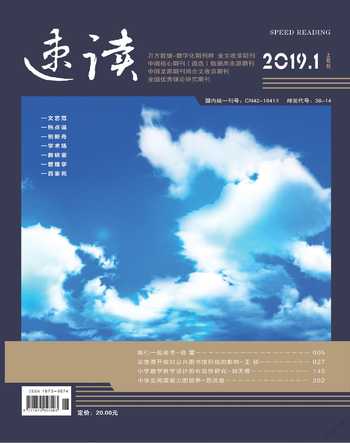The Theme of Death in Su Shi’s Jiang Cheng Zi and Milton’s On His Deceased Wife
孙燕
1 introduction
John Milton (1608—1674) was one of the greatest literary giants at the end of English renaissance.His works have occupied a high position in the history of English and world literature.Methought I Saw My Late Espoused Saint (On His Deceased Wife) is a memorial sonnet and it is the only love sonnet of John Milton in his literary career.
Su Shi (1037—1101) was a famous Chinese writer,poet,artist,calligrapher,pharmacologist and statesman of the Song Dynasty (960—1279).He found the Haofang School of the Ci-poetry in Song Dynasty.Jiang Cheng Zi was written in 1075 when he was the prefecture chief at Mizhou.
2 Literature Review
Death leaves grief and desperation to the living people; while it gives love a kind of eternity.Famous poets have written so many beautiful and attractive poems.People have already made research on memorial poetry.They have found some differences between Chinese and western memorial poetry.Some scholars have also studied Su Shi and John Milton’s poems.In Liu Lili and Li Feng’s Religious Influences on Su Shi and John Milton’s Memorial Poems,they find Puritanism was deeply rooted in John Milton’s soul.His works are the combination of renaissance humanism and Christian Puritanism.In Su Shi’s poem,They said three religions—Confucianism,Buddhism and Daoism played an important part in Su Shi’s life and works.
3 Similarities in Jiang Cheng Zi and On His Deceased Wife
3.1 The Same Theme
The themes of the two poems both are to memorize the poets’ deceased wives.Su Shi’s Jiang Cheng Zi was written to mourn his wife Wang Fu.He married Wang Fu When he was nineteen.The couple loved and respected each other very much.But unfortunately,Wang Fu died early.After more than 20 years,he dreamed of her,so he wrote this poetry which is widely read and still famous today.
John Milton married Catherine Woodcock in 1656,at that time Milton had been blind for four years.She was so genial,kind and good that she looked after Milton carefully.But this happy time was so short,Catherine died one year later,with her two months baby girl.In 1658,Milton wrote the poem after a dream.
Although Su Shi’s Jiang Cheng Zi and Milton’s On His Deceased Wife were written at different times,the theme which they tried to express was the same.Through the poems they expressed strong love for their wives.Every word of the poems reveals this kind of feeling.It is so touching that it gives these two poems eternal life.
3.2 The Same Expression
Both of the two poems used dream to show the poets’ grief to their wives.They did not just write what they dreamed,but also wrote their real life’s experiences.They mixed their unhappy and unfortunately life into the dream.
Su Shi lived a hard life as a statesman.He once had been exiled to Zhanzhou,Huangzhou,Huizhou,Dingzhou,Xuzhou,Mizhou and Hangzhou during all his political time.“How long grave is far,a thousand miles a way,to whom can I my grief convey? (千里孤坟,无处话凄凉)” Although time flied and life changed,his wail to his wife was never disappear,and this kind of wail was unconscious and occurred at times.He felt lonely with thousands of miles away from his home and his wife’s grave.This distance between living and dead showed his lament with an eternal regret that they would never meet together.“Revived even if she be,could she still know me? My face is worn with care,and frosted is my hair(纵使相逢应不识,尘满面,鬓如霜)” show us a picture of how he looked like in his forties.Ten years’ hard time changed him so much that though in his forties,his hair was totally white and covered his wrinked face.Here the poet showed his regret that his wife couldn’t recognize him.What’s more,he sighed his bitter and lonely life from reviewing the past: “Can I not be heart-broken when I am awoken? From her grave clad with pines,where only the moon shines (料得年年斷肠处,明月夜,短松冈)”.The poet woke up with a deep sadness when facing the lonely and cold reality,he found everything gone with the dream.
Milton’s life was also full of hardship.He was one supporter of British Bougourisie Revolution (1640),also he was the spokesman of Crowell Government.Because of overtime and overweary reading and writing,Milton became blind when he was forty-four years old.While after Monarchy Restoration (1660) he became the attack aim of Charles Ⅱ’s government and was put into prison.Poor situation,bad health with disillusion of his political ideal formed Milton’s hard,sad and painful life.So he couldn’t help thinking Woodcock.This strong feeling brought him a dream,in which he saw his wife coming to him,“Methought I saw my late espoused saint”,a complicated feeling strongly assaulted the poet.But when she slowly came to him and tried to embrace him,the dream was over.Finding all the warm things gone,the poet only had endless despair and anguish.Losing such a beautiful and kind wife brought him suffering and torture.Let’s look at this sentence “I waked,she fled,and day brought back my night”.As we know,day means light for us,but for the poet,it was an endless torture for he only could enjoy happiness in his dream.The dream at night was the “light” in poet’s dark life.But when the day was coming,everything awoke from dark,only he sank into an endless dark without happiness and brightness.
We can say that the miserable life give the two poets the same feeling which makes them choose the same way to express.They put real life and dream world together which form a kind of violent contrast.The dreams show us their deep love for their wives,but on the other hand they tell us how lonely and miserable they are without their wives.
4 Conclusion
From this paper,the similarities of the two poems are found,the two poet’s love and yearn to their wives are the same,also the way they express this theme is equivalent.From this study,one common thing——human feeling is beyond time and space can be found.Their mourning to their wives are sincere and truehearted.
Bibliography
[1]Wayne Booth.Paradise Lost and Selected Poetry and Prose John Milton[M].New York:Rinehart Editions,1951.
[2]劉丽丽,李丰.苏轼与米尔顿悼亡诗中不同的宗教影响[J].科技信息,2008:211-212.
[3]吴伟仁主编.英国文学史及选读(上)[M].北京:外语教学与研究出版社,1988.
[4]朱靖华.苏轼论[M].北京:北京出版社,1997.
[5]许渊冲译.宋词三百首:汉英对照[M].北京:中国对外翻译出版公司,2007.

